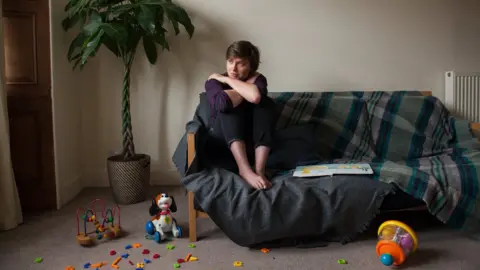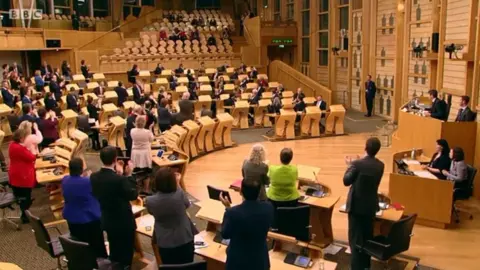Progress from domestic abuse law too slow - report
 Laura Dodsworth
Laura DodsworthThe implementation of the Scottish government's flagship legislation on domestic abuse is not good enough, according to a new report.
The 2018 Domestic Abuse Act created a new offence around non-physical forms of abuse such as coercive control.
A report by the Scottish Parliament's Justice Committee said progress on achieving its aims was too slow.
It called for a group of experts to be set up to make improvements to the way the law was used.
The Scottish government said it would carefully consider the recommendations.
A spokesperson added: "As this report highlights, there is still more that needs to be done to improve the justice response to domestic abuse and we will work with justice agencies to consider the recommendations."

When the Act came into force in 2019, the then Justice Sectary Humza Yousaf said he was proud Scotland was "leading the way with this ground-breaking legislation".
But giving evidence to the committee, academic Dr Claire Houghton, of Edinburgh University, said the system of reporting and going through trial was still "unremittingly grim" for victims of domestic abuse.
The committee's report said it did not doubt Police Scotland's commitment to tackling domestic abuse but it called for improvements in how officers were trained.
It said more must be done to ensure police officers were trained to recognise the types of domestic abuse situations covered by the act, particularly those of a non-physical nature.
The report also highlighted criticism of the current sentencing regime for crimes of domestic abuse and whether more could be done in relation to breaches of non-harassment orders.
It called on the Scottish government to consider whether current sentencing policy for offences and for breaches was providing adequate protection for victims.

'Police were fantastic'

Emma Artis said it took years of leaving and returning to her abusive ex-partner before she finally got out.
She said her experience with the police was very positive but that she would like to see big changes to sentencing.
The abuse was financial and emotional for a long time. She said he tried to strangle her and took a knife to her throat.
"The change in the law happened in the April 2019 and I phoned the police in the July," she told BBC Scotland.
"It was the first time I had phoned the police but it was either that or I was facing the end of my life.
"For four years my ex-partner had been saying it was all about me not supporting him and that I was letting him down.
"I took the risk that I wouldn't be believed but the police were fantastic.
"They validated me. I had such a feeling of relief."
Her ex-partner received a nine-month custodial sentence.
"I am so lucky compared to so many other women," Emma said.
"I realise that but I just don't think it's fair that all these crimes he committed are put under domestic abuse.
"If he had not been my partner he would have got a much harsher sentence. I was strangled and threatened with a knife.
"Although Scotland is really stepping up, the sentences in domestic abuse cases are just too low. You need to think what message does that send?"

Step change
The new law came into force in April 2019.
In the first year only 252 people were prosecuted under the act. In 2020-21 that increased to 420.
Police Scotland records about 65,000 incidents of domestic abuse a year.
Prof Michele Burman, one of the experts who gave evidence to the committee, told the BBC: "There needs to be greater understanding and improved implementation of the legislation."
She said this needed a "step change" by the police from approaching domestic abuse as a single incident to more of a course of conduct.
Prof Burman said this may mean considering the broader background and the occurrence of different forms of abusive behaviour, including emotional and financial abuse.
She said police needed to be aware of how abusers may exert coercive and controlling behaviour, which could sometimes be quite subtle and nuanced.
Giving evidence to the committee earlier this year, Det Ch Supt Sam Faulds said there were about 140 to 150 calls to Police Scotland a night about domestic abuse.
She said it was "unfair not to recognise that they [the police] do not always get the time to sit down and build enough of a relationship with victims".
She said they could not send a specialist officer to 150 calls a night.
In response to the committee report, Det Ch Supt Faulds said Police Scotland was determined to continually improve its response, especially from the crucial first point of contact.
She said the delivery of training on domestic abuse matters had been disrupted by the Covid pandemic but they were ensuring it got back on track.
The training includes identifying the full spectrum of abusive behaviours, including coercion and control, she said.
Conservative MSP Pam Gosal, who is proposing a domestic abuse register, said: "It is clear that current domestic abuse laws brought in by the now first minister when he was justice secretary are simply not robust enough.
"The SNP's soft-touch justice attitude - including a presumption against short-term sentences - means that these dangerous offenders are free to offend again.
"The needs of victims are an afterthought for SNP ministers which is why I have brought forward plans for a domestic abuse register - which would operate in a similar way to the sex offenders register - and give far greater protection to domestic abuse victims than they currently enjoy."
